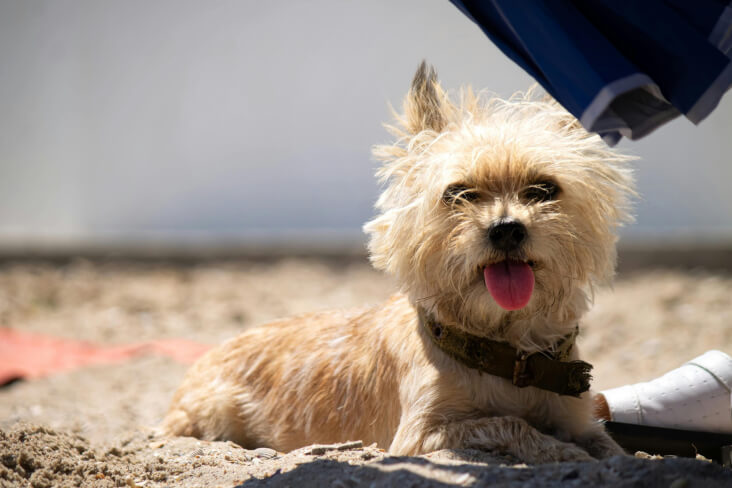Humans are usually caught yawning when they’re tired. Like before bed, or in that Friday afternoon business meeting after a long week.
But did you know that dogs yawn for all kinds of different reasons?
And some of them are fascinating and can reveal clues to the inner world of your dog.
Today we’ve put together this post to tell you all about your dog’s yawn and what it means.
So next time you catch them doing it, you can understand more about what they’re trying to tell you…
The Science Behind Yawning
Over the years there have been many theories behind why dogs yawn.
It was first thought that yawning helped more oxygen get to the brain.
But this theory has been proven wrong.
Now, it is thought that yawning is a cooling mechanism for the brain that helps to keep dogs more alert.
The theory is that when body temperature is warm, they feel more tired and sleepy.
So yawning helps to counteract this.
This is thought to be true because dogs tend to yawn more in warmer temperatures.
So, Why Do Dogs Yawn?
Yawning is the first expression dogs learn to use as puppies.
And unlike humans, dogs yawn for all kinds of reasons – not just when they’re tired.
Some of these reasons might be obvious, others you might not expect.
And these less obvious reasons are important to understand how your dog is feeling.
Let’s dive in and take a look at the most common explanations…
Stress
One of the reasons your dog may yawn is stress.
If this is the case, it will probably be accompanied by other forms tense body language, such as:
- Flattened ears
- Lip licking
- Wide eyes
- Tense muscles
Body language like this is similar to our own nervous body language like foot tapping or nail biting.
During training sessions, your dog might yawn if they know they have done something wrong and punishment is coming.
Or you might notice that your dog begins to yawn around certain people. This could mean that they’re uncomfortable with that person, or something about them (like a certain colour coat).
It can be useful to be clued into your dog’s stress signals like this…
Because often a dog’s yawn when stressed isn’t conscious. It is usually more of an involuntary tell that escapes them to give away how they’re feeling.
So it allows you to get one step ahead of your dog and combat their stress before it starts.
Confusion
Another common reason that your dog might yawn is confusion.
This is a classic sign of frustration.
Have you ever been in a training session and noticed your dog has started yawning?
This might be telling you that your dog is confused and doesn’t understand what you are asking them to do.
Maybe the command is too difficult, or they have forgotten what it means.
Try going back a few steps and helping your dog understand.
Excitement Or Anticipation
Did you know that dogs can also yawn when they’re excited?
So yawns in dogs could actually be interpreted as a compliment!
If you go to grab their collar and lead, and they start to yawn. Don’t assume that they’re tired and don’t want to go for their walk. They’re probably just looking forward to it.
Their energy is pent up and they have no other choice but for it to escape through an involuntary action.
You might see the same reaction when someone your dog likes enters a room, or when the postman knocks on the door.
Anticipation and excitement is often too much to bear, and escapes your dog in the form of a yawn.
A Calming Signal
Sometimes, dogs might yawn as a form of communication with other canines.
This is usually seen in dominant dogs – and has been observed in both domestic dogs and wild wolves.
When the dominant dog is confronted with a submissive or fearful pack member, they might yawn to show a lack of concern.
A signal to say “it’s ok, I’m not going to bite.”
This can help to put the other dog at ease and avoid conflict by getting on the same page.
When They Need A Break
Yawns might also be indicative of mental exhaustion.
It’s a way of your dog saying “I’ve had enough” or “my patience is wearing thin”.
This might be during a training session, or obedience class.
If you notice your dog doing this, try giving them a cooling off period. Or end the training session for the day.
If you’re clued into when your dog needs a rest, it can make for more effective training.
It’s Contagious
Just like humans, dogs can catch yawns.
This isn’t the same in all animals. In fact, other than in humans contagious yawning only happens in chimps, baboons and dogs.
Which makes your dog pretty special….
So the next time you yawn, take a look at your dog. They might just be doing the same thing.

They’re Just Tired
Of course, there are always going to be times when a yawn is just a yawn.
If your dog is curled up and snoozing on their bed, they’re probably just tired.
But it’s useful to know the other things your dog might be trying to tell you with this one simple facial expression…
So you can stay clued into their mood and needs.
References
www.pedigree.in/article-detail/what-your-dog-yawning-really-means
www.akc.org/expert-advice/lifestyle/why-do-dogs-yawn/
iheartdogs.com/5-reasons-dogs-yawn-when-theyre-not-tired/
www.youtube.com/watch?v=cf9LaoBldRM
thehappypuppysite.com/why-do-dogs-yawn/
www.nytimes.com/2019/02/22/well/live/why-do-we-yawn.html







Comments